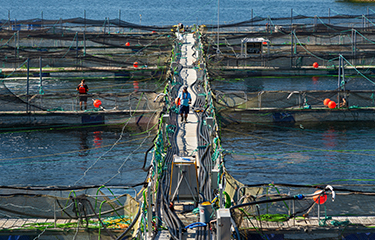Canadian court overturns order to close BC salmon farms

A ruling in Canada's Federal Court has overturned a decision by the country’s government to close all salmon farms in British Columbia's Discovery Islands by 30 June, 2022.
The push to close the farms was made in December 2020 by then-Minister of Fisheries, Oceans, and the Canadian Coast Guard Bernadette Jordan. Salmon-farming companies operating in the region – including Mowi Canada West, Cermaq Canada, and Grieg Seafood – asked the government for more time to close farms, and communities in the region said they were “blindsided” by the government’s decision.
In a 64-page ruling, Canada Federal Court Justice Elizabeth Heneghan overturned Jordan's order, saying it was made in breach of the rights of the salmon farmers.
“I am satisfied that the applicants have shown that the decision of the minister was an administrative decision, subject to the requirements of procedural fairness and otherwise, subject to review upon the standard of reasonableness,” Heneghan wrote.
Soon after the Jordan’s decision was announced, salmon farms petitioned the government to transfer smolt and undertake other activities to avoid culling salmon, but their requests were denied. Less than a year after Jordan’s decision, Mowi announced the closure of a salmon hatchery after it was forced to cull 900,000 fish. Cermaq, Canada was forced to cull 1.5 million salmon after the company was not granted an injunction.
“The decision of the former minister continues to challenge our company and has lasting implications,” then-Mowi Canada West Spokesperson Dean Dobrinsky said in October 2021. “It is clearly evident her decision is far-reaching, incredibly damaging to the communities where we operate, and could have been mitigated had the ministry engaged with our company to fully understand the impact on coastal communities who depend on this sector.”
Heneghan’s ruling said Jordan “did not demonstrate a full appreciate of the facts" in making her decision.
“The minister ... said that the intention of her decision was to allow time for the fish in the farms to ‘grow out’ and that the fish already in the farms be harvested in order ‘to avoid culling,’ [but] the consequences of the decision were completely the opposite," Heneghan wrote.
The judge also pointed out that the language used by Jordan regarding the decision changed between 16 December and 17 December, 2020. Jordan called for “no hatchery smolts” and “no new fish of any size” be introduced into the Discovery Islands, which required the culling of salmon, despite her earlier assertion the culling of salmon was to be avoided.
“These two positions cannot be reconciled,” Heneghan wrote.
Heneghan said salmon farmers had overcome “carry a heavy burden” to prove Jordan’s decision was unreasonable.
“I am satisfied that the applicants met that burden,” Heneghan wrote. “[Jordan's] decision, in the absence of reasons, cannot be justified. In the absence of reasons, it is not transparent. In the absence of reasons, it is not intelligible.”
The BC Salmon Farmers association celebrated the decision, which comes just months before a cutoff date prohibiting all salmon farming in the Discovery Islands.
“The BC Salmon Farmers Association is encouraged that the Federal Court has set aside the decision of the minister to remove salmon farming in the Discovery Islands,” the organization said. “This is a positive development for the coastal Indigenous and non-Indigenous communities in which we operate, and the thousands of family-supporting jobs our sector sustains. We will be reaching out to First Nations in whose territories we operate to review this decision and will have more to say in the following days and weeks ahead.”
Photo courtesy of Alexander Gold/Shutterstock






Share